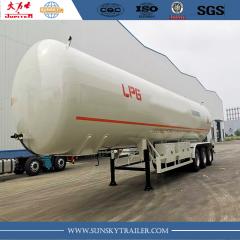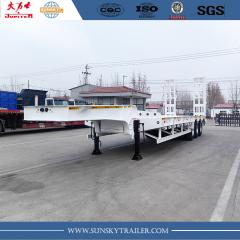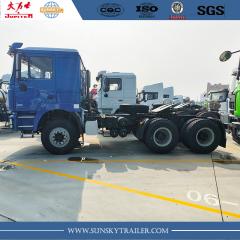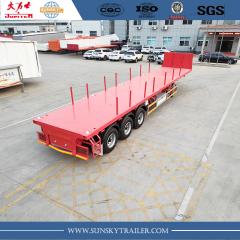-
 3 Axle Lpg Gas Tank Semi Trailer
3 Axle Lpg Gas Tank Semi Trailer
-
 Low Bed Trailer
Low Bed Trailer
-
 SHACMAN F3000 Tractor Truck
SHACMAN F3000 Tractor Truck
-
 Flatbed Pillar Trailer
Flatbed Pillar Trailer
SUNSKY VEHICLE, a manufacturer of flatbed semi-trailers, has found that the Flatbed Pillar Trailer i...
Hazardous substances and chemicals, such as acids, in large quantities, endanger human health and harm the environment as a whole. Industrial production of such chemicals takes place all over the world, and it is done with extreme caution, especially in the manufacturing location. These acids, for example, would have to be transported to different parts of the world. Transportation is crucial when it comes to directing the flow of products to customers.
As a result, certain modes of transport for acids would require more specialized packaging than other goods. As technology and manufacturing have progressed, acid storage and transportation have become more common.
What is the definition of an acid tanker?
An acid tanker is a vessel that transports various acids for various industrial applications, including sulfuric acid, hydrochloric acid, hydrofluoric acid, nitric acid, and acetic acid, among others. The chemical and physical properties of acids vary. Different acids require different materials in the construction of their respective tankers in this case. It is not necessary, however, to have a different tanker for each type of acid.
Let's take a look at some of the most important characteristics of an acid tanker:
· Structure
The hydrochloric acid tanker has multiple layers of dilute sulfuric acid. In some cases, the outer structure is made of stainless steel or an aluminum alloy. Polyethylene is used to line the interior of the tank (PE). Despite being made in separate processes, the outer shell and inner PE liner become integral parts of the acid tank trailer as a whole.
· Material
The dilute sulfuric acid, hydrochloric acid tanker's multilayered structure is made of stainless steel or an aluminum alloy. For these types of tanks, stainless steel has traditionally been the primary structural material. Steel is only susceptible to a few substances, the majority of which are acids.
· Corrosion
All flanges are typically made of plastic to prevent corrosion from spreading to other parts of the tank. Even when exposed to strong chemicals like sulfuric acid and hydrochloric acid, plastics are naturally non-corrosive. Because they are non-reactive with the vast majority of materials encountered, this is the case. The tank trailer will not corrode as a result of this.
· Safety precautions
Acid tank trailers cannot corrode, which is correct. All chemical tank trailers, on the other hand, should undergo standard safety checks and procedures. The storage tanks' service life is usually estimated to be between 20 and 40 years. The thickness of a storage tank should be checked at least once every two years for safe operation, and at least once every five years for an internal inspection.
Bringing things to a close
Acid tankers are designed specifically to transport a variety of liquid chemical cargoes. Bulk liquid chemicals, acids, edible oils, alcohols, biofuels, and clean petroleum products are all carried in large quantities.
Zinc-coated or stainless steel tanks, sophisticated acid tankers, and technical crews capable of handling sometimes toxic, flammable, or corrosive products are required due to the complexities of these compounds.
For more information on tankers and other trailers, go to https://www.sunskytrailer.com/.




